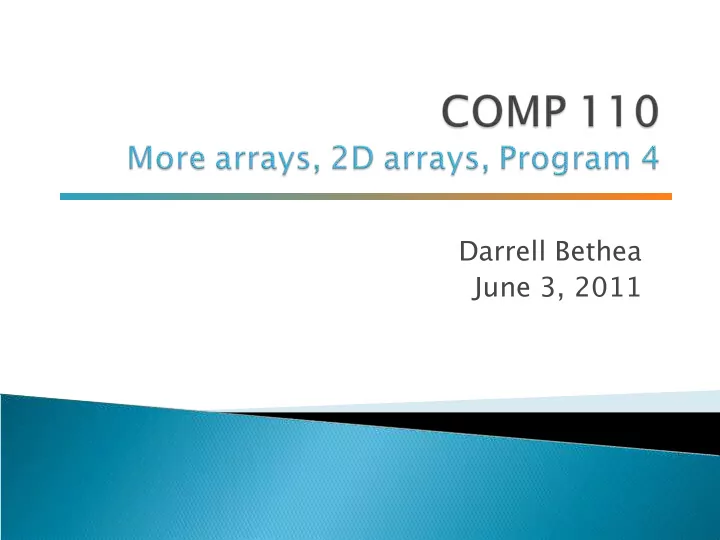

Darrell Bethea June 3, 2011
Lab 8 solution posted Program 4 due in 1 week Final exam ◦ 6/13, 8-11 AM ◦ SN014 2
3
More about arrays 2D arrays 4
public class Weather { private double[] temperature; private double[] pressure; public void initializeTemperature(int len) { temperature = new double[len]; } } 5
When you create an array of objects like this: Student[] students = new Student[35]; Each of the elements of students is not yet an object You have to instantiate each individual one students[0] = new Student(); students[1] = new Student(); …or do this in a loop 6
Smiley[] smilies = new Smiley[3]; for (int i = 0; i < smilies.length; i++) { smilies[i] = new Smiley(); } 1045 ? 2584 ? 2836 ? true false false GREEN BLUE CYAN 3 1 4 7
Student[] students = new Student[5]; for (int i = 0; i < students.length; i++) { students[i] = new Student(keyboard.nextInt()); students[i].printAge(); } 8
public void changeArray(int[] arr) { int len = arr.length; arr[len – 1] = 25; } 23 47 52 14 25 7 9
public double[] buildArray(int len) { double[] retArray = new double[len]; for (int i = 0; i < retArray.length; i++) { retArray[i] = i * 1.5; } return retArray; } 10
No di fg erent from using a regular variable public void printNum(int num) { System.out.println(num); } public void doStu fg () { int[] scores = { 15, 37, 95 }; for (int index = 0; index < scores.length; index++) { printNum(scores[index]); } } 11
Arrays having more than one index are often useful ◦ Tables ◦ Grids 0: Open 1: High 2: Low 3: Close 0: Apple Inc. 99.24 99.85 95.72 98.24 1: Walt Disney 21.55 24.20 21.41 23.36 Co. 2: Google Inc. 333.12 341.15 325.33 331.14 3: Microsoft 21.32 21.54 21.00 21.50 Corp. 12
int[][] table = new int[4][3]; or int[][] table; table = new int[4][3]; 13
int[][] table = new int[4][3]; gives you the ability to use table[0][0] table[0][1] table[0][2] table[1][0] table[1][1] table[1][2] table[2][0] table[2][1] table[2][2] table[3][0] table[3][1] table[3][2] 14
We used a loop to iterate over a 1D array int[] scores = { 13, 57, 93, 60, 102 }; for (int i = 0; i < scores.length; i++) { System.out.println(scores[i]); } 15
How about a 2D array? int[][] table = new int[4][3]; Use a nested loop for (int row = 0; row < 4; row++) { for (int column = 0; column < 3; column++) { table[row][column] = 25; } } 16
You can have more than two dimensions int[][][] table = new int[4][3][5]; Use more nested loops to access all elements 17
public void print2DArray(int[][] arr) { for (int row = 0; row < arr.length; row++) { for (int column = 0; column < arr[row].length; column++) { System.out.print(arr[row][column] + " "); } System.out.println(); } } 18
public int[][] giveMeAnArray() { int[][] table = new int[4][3]; // put values in the table return table; } 19
int[][] table = new int[4][3]; table.length is the number of rows, or the integer in the first pair of brackets (4) table[i].length is the number of columns, or the integer in the second pair of brackets (3) 20
int[] scores = new int[5]; scores is a one-dimensional array ◦ base type is int int[][] table = new int[4][3]; table is also in fact a one-dimensional array ◦ base type is int[] We still refer to table as a two-dimensional array 21
START EARLY. 22
Recommend
More recommend